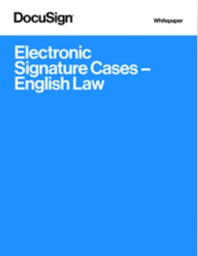Electronic Signature Cases – English Law
The case law on electronic signatures is best understood with an appreciation of the legal function of signatures. Usually, when we sign documents, there is no actual legal requirement to use a signature.
We sign voluntarily, to show that we associate ourselves with the contents of the document – be it a letter, a contract, an acknowledgment of receipt or some other kind of legally significant document. For a contract, the act of signing also shows that we intend to conclude the contract and be bound by its terms.
Download now to find out more!
Read More
By submitting this form you agree to DocuSign contacting you with marketing-related emails or by telephone. You may unsubscribe at any time. DocuSign web sites and communications are subject to their Privacy Notice.
By requesting this resource you agree to our terms of use. All data is protected by our Privacy Notice. If you have any further questions please email dataprotection@techpublishhub.com


More resources from DocuSign

Increase Your Productivity with DocuSign for ...
Microsoft has teamed up with DocuSign to make our industry-leading eSignature apps available to businesses and consumers within Microsoft applicati...

Digitising Financial Services Agreements
Many financial services firms have automated the vast majority of key processes and customer experiences. However, the 'last mile' of most transact...

Streamlined Recruiting, Hiring, and Onboardin...
HR is all about serving your people, whether they are shiny new recruits or lifetime employees. But all too often, outdated and cumbersome paper-ba...

